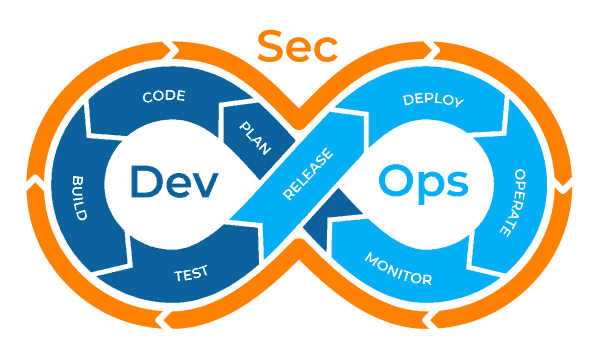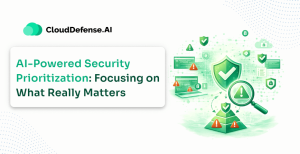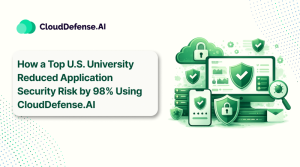Wondering how you’ll secure your new startup against the myriad cyber threats permeating the Web? You can tackle this challenge head-on and secure your startup against future threats by investing in startup DevSecOps security. DevSecOps brings safety and allows time saving above else.
What is Startup DevSecOps Security?
DevSecOps is a development philosophy aimed at incorporating security measures into the standard DevOps routine, which itself emphasizes short, agile development cycles to ensure the release of regular software. By adding security to the mix, security measures are fully integrated with software development from start to finish, preventing later security breaches and lowering the workload.
Given that 43% of cyber-attacks target small businesses, and that up to 60% of victims of cyber attacks go out of business within six months, you can’t afford to ignore security for your startup.
Following DevSecOps will primarily involve positioning security tools and/or practices to identify threats and minimizing possible vulnerabilities by ensuring smart security practice throughout the SDLC.
Enjoying the idea of safe startups, and saving time and money ? Want to know how to incorporate DevSecOps into your startup for success? Our guide will show you how to do so step-by-step.
Startup DevSecOps Security US Guide 2025
Under a traditional or classic software development philosophy, software developers create new versions of applications every few years or even every few months.
of applications every few years or even every few months.
In these situations, security concerns are tested and overseen by separate teams (both internal and external) from development.
With the advent of public cloud technology and microservice models, agile development practices have become key to maintain economic advantages. Though containers, cloud technologies, and microservices have caused the DevOps philosophy to be adopted industrywide, DevOps is still flawed.
Security isn’t usually enough to keep up with the rapid speed at which new code is produced and incorporated into existing software. DevSecOps is the answer to this problem. It fully integrates security testing into both the CI (continuous integration) and CD (continuous delivery) pipelines.
Perhaps more importantly, DevSecOps forces your development team to build the skills and knowledge necessary to look for and test security threats – security testing and fixing can both be done internally.
DevSecOps Brings Speed and Security to Your Startup
At its core, DevSecOps minimizes the amount of time your team will need to spend going back and repairing patches in their code for your final product. As its name suggests, Dev”Sec”Ops means bringing security practices and/or technologies into the development cycle, as well as bug-prevention.
Not only does this save you money in your development budget, but it also protects you from security breaches that might otherwise go public before you catch them. Which can cost you a lot if you are not careful. With DevSecOps you can still do everything you already are but safely and confidently.
How DevSecOps Saves You Money
It’s easy to see how DevSecOps can save your startup money, particularly in the early years when cash might be low. An improperly released product with a big security flaw can be a fatal blow to a startup depending on a successful launch. Even in the long term, DevSecOps may save your startup money by catching security flaws before release and by allowing you to handle security fixes and tasks in-house.
You won’t necessarily need to hire an external team or specialized security programmers for the job.
How DevSecOps Protects Your Startup
As your startup creates its first app(s), DevSecOps can protect you in several key ways. DevSecOps brings![]() security, boost, incorporation and logging.
security, boost, incorporation and logging.
Firstly, DevSecOps improves security positioning during the development process. By training your development team to look for security errors and to incorporate container tech and similar tools, you’ll identify security flaws individually and (ideally) as soon as they are created/discovered.
Thus, you can then deal with security issues immediately rather than discovering them months or years later down the road.
Next, DevSecOps boosts the ruggedness or resiliency of your startup and its software products. Because DevSecOps practices demand that every line of code be examined and pass various security regulations, the odds of a product having a glaring security flaw dramatically decrease. More secure software means a better reputation and greater profits for your startup’s bottom line.
DevSecOps also relies on the incorporation of drills for your developers. Though it will take some time to incorporate, as learning any new skill does, drills can help your team identify vulnerabilities, particularly as they learn to use different forms of testing to catch as many errors as possible.
Lastly, DevSecOps practices also involve extensive and thorough logging of errors or code checks. This practice boost security awareness across your company. Every resource examined will be reported and every security flaw understood by the relevant developers on your team.
Combined, these major aspects will protect your startup from the majority of likely cyber threats or security problems. From safety to logging, DevSecOps brings something new to the table.
Three Ways to Reinforce Security Within the Startup Culture
Given the benefits of DevSecOps, many executives or startup CEOs wonder why their development teams have difficulty adopting these practices. In rare cases developers not interested in DevSecOps.
In most cases, it’s simply because some developers are more used to standard DevOps practices and may be resistant to changing their working habits or pipeline priorities. In other cases, it’s a matter of education – older developers may not be aware of DevSecOps practices and must be taught them.
In any event, you can reinforce security within your startup’s culture using three key strategies.
Schedule Periodic Training Sessions
Firstly, schedule periodic training sessions that can bring DevSecOps practices and security techniques to all the developers on your startup’s team. Periodic training sessions are not only good for bringing certain developers up to speed with modern practices, but also effective at ensuring that your developers are aware of new and evolving practices or tools at their disposal. Virus-makers are always evolving, and your security practices must evolve as well to maintain resiliency.
Reporting System
Next, you can create an “Easy Reporting Mechanism” for your team to utilize. This allows any employee to report suspicious activities or report security flaws they’ve uncovered. An easy example is simply an email address, like security@yourcompanyname.com. When you create this tool, make sure that responses and follow-ups are ready to go as well – otherwise, your developers may not believe in the reporting mechanism or use it consistently, which will defeat the purpose of DevSecOps.
Penetration Testing
Lastly, have your team schedule penetration testing on a regular basis. You should do this at least annually, even though it may cost several thousand dollars. The cost is well worth it in terms of security. A penetration test will ideally simulate targeted phishing attacks on your employees and other common security gaps. For instance, each time an employee opens a risky email, they open the company up to a virus. Penetration testing will check to see if your developers do this regularly, allowing you to educate them on the issue. The more penetration testing you do, the more information your startup gains about how to mitigate cyber threats and shore up your startup’s defenses.
The Benefits of DevSecOps for Your Startup
At times, it may be beneficial for you to explain why DevSecOps is a superior development philosophy compared to others, even your own developers. Or you may personally be curious about the direct advantages that DevSecOps provides. In either case, incorporate DevSecOps for your startup ASAP.
Spotting Vulnerabilities and Bugs Early
By incorporating security practices like code checking and penetration testing into your development pipeline, you’ll spot vulnerabilities and bugs in the code much earlier than you would otherwise. Developers will eventually see the value in this even if they are initially resistant – it will save them a lot of time later down the road. Beating your head into the wall won’t save any money or nerves.
With a traditional development philosophy, they might have had to go back into the code and rewrite entire sections once a bug was discovered. While DevSecOps removes the need for it completely.
Use Open Source Tools Safely
DevSecOps further allows your team to use open source tools safely. All open-source tools must be ![]() cross-checked between development members and each line of code analyzed thoroughly for possible incompatibilities or security flaws.
cross-checked between development members and each line of code analyzed thoroughly for possible incompatibilities or security flaws.
While this takes time initially, once an open-source tool is approved, your team can use it freely without having to worry about any code related issues in the future.
As an added bonus, open-source tools can help you save money since you won’t need to develop in-house tools for specific additions to your software. All that because of addded security.
Save Costs
Though regular penetration testing does cost some cash from your development or security budget, save costs overall by:
- Almost entirely eliminating the chance of a costly security breach later
- Eliminating the need for a dedicated yet separate security team to go over your software
- Minimizing the time needed for security checks or code rewrites
Once your team gets into the swing of things, DevSecOps will save your startup money. Any startup with a relatively narrow profit margin should be interested in this development philosophy.
Make Developers Security Aware
Many developers by their nature like to specialize, but this is often a flaw when it comes to modern software development projects. By incorporating DevSecOps practices into your development pipelines, your developers will become security-aware and become skilled professionals.
Not only does this benefit them (since they will be able to use their skills better), but it benefits you since you can rely on their expertise to create airtight software without obvious security holes.
The best bug is one that never crops up. The second best bug is one that your team catches as soon as it’s written into code – that way, they can eliminate it ASAP and get back to development.
Reduce Legal Risks
Lastly, DevSecOps offers a big benefit in that it reduces legal risks.![]()
If other companies use your software and it is secure from the ground up, you won’t need to worry about legal claims being brought against your startup in its infancy because of a single bad line of code or an improperly designed module.
In the early days, when your startup probably doesn’t have enough cash to afford an expensive legal team, legal claims can stop your business from launching before it truly gets started. DevSecOps can prevent this unhappy end from ever occurring.
Best Practices for DevSecOps in Startups
For your startup to benefit from DevSecOps security practices, you’ll want to prioritize a few major strategies/focuses that are crucial to the whole process, and can’t be neglected or overlooked.
The first is container and service management. Microservices and container technologies are vital not only for DevSecOps security but also agile app development. Your team should already be using these practices, but if not, start making the transition to incorporating containers and micro services ASAP.
Next, incorporate regular vulnerability scanning into your development pipeline. By checking for vulnerabilities early and proactively, you’ll catch bugs as they occur rather than months later after they’ve been buried beneath so much code that fixing them demands a total app rewrite.
Good DevSecOps startup security also incorporates automation as much as possible. This includes automated security tools to save your developers time and energy.
Lastly, be sure to double down on your reporting practices and standards, including traceability, auditability, and visibility. Every bug should be reported, all actions performed according to standard procedures, and paperwork filed properly so you can always easily discover a security vulnerability, when it was discovered, how it was patched up and lastly by whom was it discovered.
Each of these best practices will contribute to greater DevSecOps startup security across the board.
Cost of Fixing vs Preventing Bugs
Perhaps the biggest reason to adopt DevSecOps security practices for your startup is cost. Simply put, it costs less to prevent bugs than it does to fix bugs after they have already wreaked havoc on your software and/or your reputation.
Example Startup Security Scenarios
Imagine a scenario in the early days of creating a software that your most important clients are excited![]() about. Unfortunately, one of your developers writes code with a small gap that compounds over time. Unbeknownst to anyone for the first few months, the bug lies dormant, undetected. Because your DevOps practices don’t incorporate code checking the same way DevSecOps practices do, no one catches the bug until three days before software launch.
about. Unfortunately, one of your developers writes code with a small gap that compounds over time. Unbeknownst to anyone for the first few months, the bug lies dormant, undetected. Because your DevOps practices don’t incorporate code checking the same way DevSecOps practices do, no one catches the bug until three days before software launch.
As code is compiled in the software product is finalized, the bug rears its ugly head and you’re now made aware that you need to go back and rewrite huge swaths of code before the product will be release-ready. You now have to inform your clients of the delay, costing you time and money.
In contrast, the same scenario could take place with a DevSecOps-savvy developer who knows DevSecOps security practices. They write the code and the bug pops up, but they quash it after a fellow developer catches the bug during cross-checking. Development can continue now without issues. Even though it technically took an extra few hours of your developers’ time to check the code and catch the bug, that’s far cheaper in man-hours and money than the former scenario.
All in all, DevSecOps allows you to prevent bugs from affecting your final software products. It is always more expensive to fix bugs when they become a problem, even if they’re relatively small.
What You Need to Know About Proper Startup DevSecOps Security
Now that you know why DevSecOps is important, let’s go over how DevSecOps affects your startup.
DevSecOps Security is Automated
Firstly, DevSecOps security is automated. For all the concerns about regular developers wasting their time on rechecking code, DevSecOps security practices don’t require overly excessive interruptions.
In fact, DevSecOps security focuses on short, brief and frequent system life development cycles. Therefore you are given the possibility to integrate your security measures by using microservices and containers alongside regular automated testing tools. Certain testing tools can be calibrated to check for certain types of security breaches as your developers write code line by line.
DevSecOps Security is Built for Containers and Microservices
Next, DevSecOps is designed to be used with containers and microservices. This is beneficial since your development team should already be using these tools if you want to be a successful start.
But your developers should also align specifically with containers specific security guidelines. Build your security into the development processes for your apps or software from end to end. Remember, the whole point of DevSecOps security is that it is continuous and ongoing; it never actually starts at a specific point and it never ends until your company goes out of business.
DevSecOps Focuses on Rapid and Cost-Effective Delivery of Software
To that end, DevSecOps security focuses should emphasize rapid and cost-effective software delivery. Integrate security practices such that they become a part of your primary development pipeline procedures and objectives. This will help keep their interruption into your development process minimal, plus make DevSecOps security adoption by your developers a little smoother.
DevSecOps Brings Proactive Security to Your Company
DevSecOps is crucial for your startup in large part because it focuses on proactive rather than reactive![]() security. As explained above, reacting to bugs or code breaches as they are discovered by hackers or customers is never a good idea.
security. As explained above, reacting to bugs or code breaches as they are discovered by hackers or customers is never a good idea.
Reactive security means you’ll always be scrambling to account for new cyber threats and problems, costing you time, money, and reputational goodwill that’s very hard to get back. In contrast, DevSecOps security is proactive.
You tackle problems before you know they’ll actually affect your business, minimizing any effects they might one day have. In the best-case scenarios, the proactivity brought to your startup by DevSecOps security means that you’ll never have a major security breach throughout the lifespan of your company. This golden scenario is only possible if you integrate security with your development cycles.
DevSecOps Means Faster Security Patching
Even better, DevSecOps security allows you to enjoy accelerated security vulnerability patching. In a traditional development cycle, security checks take place at the end of development. In the worst-case scenario where a major, app-breaking bug is discovered, your team then needs to spend hours, days, or even weeks patching up the security flaw. All the while, you’ll be burning money, making excuses to your clients and customers, and reorganizing your future projects in order to make deadlines work.
No startup can subsist for very long with that kind of development cycle and chaos. Through DevSecOps startup security practices, your security vulnerability patching will happen either right after a vulnerability is found or before it develops enough to affect other sections of your app. It’s always better to fix a problem earlier rather than later, even if it costs you a little bit of time in the short term.
DevSecOps is Forward-Focused
Lastly, DevSecOps’s automated focus is very compatible with modern development cycles and new technologies. By adopting DevSecOps security for your startup, you’ll be well-positioned to incorporate new tools and philosophies as they evolve in the IT-sphere and as your developers bring new insights and skills into your organization. In short, DevSecOps allows you to run an agile and forward-focused startup rather than a dinosaur that will soon be outpaced by new organizations more willing to lean into modern solutions for modern challenges. Implementing DevSecOps shows startup’s worth.
FAQ
What is DevSecOps Security?
DevSecOps Security involves shared security responsibilities from start to finish during a development pipeline. With other development philosophies, security is usually handled by a specialized, and possibly external team. Security checks are carried out at the end of the development cycle.
DevSecOps security is different. Security practices are initiated and maintained throughout the development lifecycle of software and incorporated by all or most members of the development team.
How do I Secure My Startup?
To secure your startup from the getting, make DevSecOps the sole development practice standard for each of your developers. To get everyone up to speed, incorporate regular seminars and training sessions to teach everyone DevSecOps security practices. Make sure everyone attends.
Then, be sure to host new seminars on updated topics as DevSecOps practices evolve and as new tools and technologies become available. Note that, through DevSecOps security practices for your startup, you won’t need to hire a dedicated security team except under very specific circumstances.
Your regular developers, if educated correctly, should be able to handle all security checks necessary for your startup and any apps you build. While it may still be a good idea to occasionally hire someone external to perform an in-depth penetration test or otherwise test your security measures, most security checks and fixes will be handled by your core development team, as well as checking for bugs.
Do Startups Need Cybersecurity?
Absolutely. A huge proportion of cyber-attacks affect small businesses, which includes the majority of startups. Additionally, startups don’t have the infrastructure, reserve cash, or goodwill of the public to withstand major cyber breaches or product failures.
In the early days of startup operations, every dollar counts. DevSecOps security can help you save money and avoid costly security breaches that break apps, lose customer information, or worse.
Conclusion
Understanding and integrating startup DevSecOps security is crucial if you want your organization to thrive throughout its most fragile first months and years. With proper DevSecOps security practices in place, your development team will be versatile, your company will save money in the long term, and your customers or clients will be impressed with the quality of the software you create.







